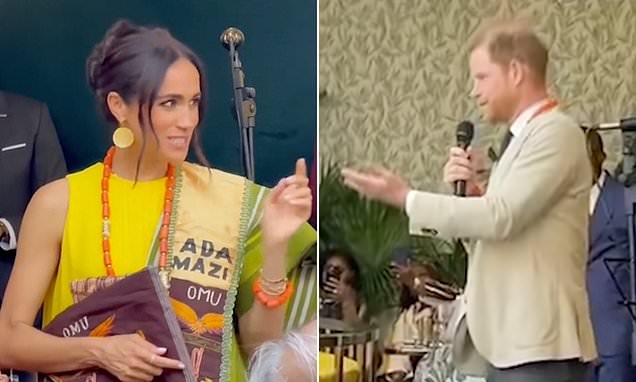In Cali, Colombia, the Afro Women and Power Conference was intended to honor the contributions and challenges faced by women of African descent.
However, the event took an unexpected twist when Meghan Markle, the Duchess of Sussex, stepped onto the stage with her husband, Prince Harry.
Known for her advocacy of social issues, Markle aimed to connect with the Afro-Colombian community while showcasing her language skills.
As she addressed the audience in both English and Spanish, her goal was clear: to demonstrate her understanding of local culture and commitment to the conference’s mission.
But things didn’t go as planned.
Instead of warm applause, Markle was met with boos and shouts from the crowd during her speech.
This surprising reaction has ignited a firestorm of controversy, leading many to question her intentions and ability to genuinely engage with the Afro-Colombian community.
Eyewitnesses reported that the disruption began just as Markle was about to speak in Spanish.
A heckler shouted a question about transgender rights directed at Colombian Vice President Francia Mórquez, who was also on the panel.
While Markle maintained her composure and smiled at the audience, Mórquez calmly addressed the interruption, emphasizing that the program would also focus on transgender women.
Despite the initial disruption, Markle pressed on with her speech, expressing gratitude for the warm welcome from Colombia and her eagerness to connect with the community.
Yet, the earlier interruption seemed to sour the atmosphere.
As she continued, the crowd’s hostility grew, with some attendees booing and shouting in response to her presence on stage.
This incident has sparked a broader discussion about Markle’s ability to engage effectively with marginalized communities, especially those with rich cultural identities and histories of struggle.
Critics have accused her of using the event to promote her own agenda rather than genuinely listening to and uplifting the voices of Afro-Colombian women.
Local activist Claudia Restrepo voiced her concerns, stating there was a clear disconnect between Markle and the audience.
She felt that Markle appeared more interested in flaunting her linguistic abilities and royal status than in truly grasping the challenges faced by Afro-Colombian women.
The backlash against Markle’s participation has underscored ongoing tensions within the Afro-Colombian community.
Issues of representation, discrimination, and the fight for social justice are deeply entrenched, making the context of her appearance all the more sensitive.
Mariana Gomez, a community organizer, expressed that Markle’s presence, as a member of the British royal family, symbolized the colonial legacy that has historically oppressed Afro-Colombians.
For many, the conference was meant to celebrate resilience and the ongoing fight for equality.
Instead, Markle’s involvement felt like an unwelcome intrusion, laden with the historical baggage of the British monarchy.
The sentiments expressed by attendees highlighted a desire for authenticity and respect in discussions surrounding their struggles.
Additionally, questions have arisen regarding the role of the Archwell Foundation, the non-profit organization founded by Markle and Prince Harry.
Some critics have alleged that the foundation used the conference as a platform to advance its own agenda rather than genuinely empower the Afro-Colombian community.
As the dust settles from this controversial event, it becomes clear that the conversation surrounding representation and engagement with marginalized communities is far from over.

